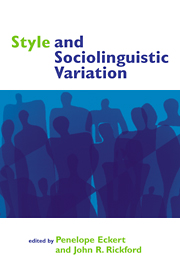Book contents
- Frontmatter
- Contents
- List of figures
- List of tables
- List of contributors
- Acknowledgments
- Introduction: John R. Rickford and Penelope Eckert
- Part I Anthropological approaches
- Part 2 Attention paid to speech
- Part 3 Audience design and self-identification
- 9 Back in style: reworking audience design
- 10 Primitives of a system for “style” and “register”
- 11 Language, situation, and the relational self: theorizing dialect-style in sociolinguistics
- 12 Couplandia and beyond
- 13 Style and stylizing from the perspective of a non-autonomous sociolinguistics
- Part 4 Functionally motivated situational variation
- References
- Index
10 - Primitives of a system for “style” and “register”
Published online by Cambridge University Press: 07 December 2009
- Frontmatter
- Contents
- List of figures
- List of tables
- List of contributors
- Acknowledgments
- Introduction: John R. Rickford and Penelope Eckert
- Part I Anthropological approaches
- Part 2 Attention paid to speech
- Part 3 Audience design and self-identification
- 9 Back in style: reworking audience design
- 10 Primitives of a system for “style” and “register”
- 11 Language, situation, and the relational self: theorizing dialect-style in sociolinguistics
- 12 Couplandia and beyond
- 13 Style and stylizing from the perspective of a non-autonomous sociolinguistics
- Part 4 Functionally motivated situational variation
- References
- Index
Summary
Introduction
In the course of reading papers for the workshop, it became clear that we do not all share the same terminology. This may appear to be a very minor concern, manageable (as stated by many) by each of us clearly defining our terminology, but on closer examination, it seems that it is not merely an issue of terminology, but a lack of agreement on what I will be referring to as the underlying primitives, the variables used for the analysis. Consequently, this discussion will be shaped by the need to agree on some finite number of primitives for the analysis of what I prefer to refer to (following Biber and Finegan, 1994) as “register,” but which is discussed in Bell's chapter under the cover term “style.”
To the degree that terminology alone is at issue, careful definitions may permit inter-researcher communication (“I say [tomeitow]; you say [tomatow].”) but to the degree that we do not share our theoretical analytical primitives, our work may not be comparable no matter how carefully we define our terms. It is not sufficient for us to each define carefully what we are looking at, if we do not reach an understanding that will permit us to all follow a research design that would make our work mutually intelligible.
The present paper will attempt to evaluate the primitives advanced by Allan Bell, whose seminal paper (1984) launched the research focus that is being discussed here.
Information
- Type
- Chapter
- Information
- Style and Sociolinguistic Variation , pp. 170 - 184Publisher: Cambridge University PressPrint publication year: 2002
